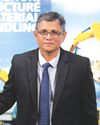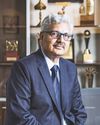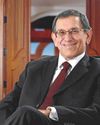
“We started as Tata Ryerson in 1997 and we were the first organized Steel Service Centre company in India,” he recalls. “The purpose of the service centre company was to make sure that customers got materials – in this case, steel – in the form and quantities they wanted. In 1997, the steel industry was dominated by two large companies, Tata Steel and SAIL.
“The suppliers had a lot of power in the equation, and customers really didn’t have any option but to take whatever steel they could get from one of those plants. But Tata Steel, looking to the future, understood that more and more customers wanted materials in processed form, and decided to set up service centres. At the time, Tata Steel’s joint venture partner, Ryerson, was the largest service centre company in the world,” he says.
A key driver of the surge in India’s steel industry in the 2000s came from the huge investment in the Indian automotive industry as it became a vehicle manufacturing centre for international suppliers. This growth also had implications for Tata’s operations.
“Companies like Ford and Nissan produce vehicles for India, but in some cases they also produce vehicles in India for their entire worldwide supply chain,” explains Abraham.
This story is from the {{IssueName}} edition of {{MagazineName}}.
Start your 7-day Magzter GOLD free trial to access thousands of curated premium stories, and 9,000+ magazines and newspapers.
Already a subscriber ? Sign In
This story is from the {{IssueName}} edition of {{MagazineName}}.
Start your 7-day Magzter GOLD free trial to access thousands of curated premium stories, and 9,000+ magazines and newspapers.
Already a subscriber? Sign In

In The Best Of Corporate Health
Under the leadership of chairman and managing director Dilip Surana, micro labs is showing no signs of slowing down in its quest to become one of the world’s leading generic pharmaceutical companies.

“OUR FOCUS IS ON OUR CUSTOMERS.”
BONFIGLIOLI TRANSMISSIONS COUNTRY MANAGER KENNADY V KAIPPALLY TALKS INNOVATION, CUSTOMER SATISFACTION AND THE POWER OF A STRONG BUSINESS CULTURE.

WE ALL TREAT EACH OTHER WITH RESPECT.“
WHEN COVID-19 STRUCK SOUTH ASIA, BD INDIA MANAGING DIRECTOR PAVAN MOCHERLA FOUND WAYS TO KEEP HIS ASSOCIATES SAFE WHILE CONTINUING TO PRODUCE THE TOOLS HEALTHCARE WORKERS NEED TO COMBAT THE VIRUS.

WE ARE ENJOYING A CONSTANT DEMAND FOR OUR PRODUCTS.
POTATO WAFERS AND OTHER SNACK FOODS HAVE PROVEN TO BE THE GOLDEN TICKET FOR CO-FOUNDER AND MANAGING DIRECTOR OF BALAJI WAFERS, CHANDUBHAI VIRANI.

Walking on water
RELIABLE ACCESS TO ELECTRICITY CAN UNLOCK OPPORTUNITIES FOR INDIA’S RURAL COMMUNITIES. AS CHAIRMAN AND MANAGING DIRECTOR OF NATIONAL HYDROELECTRIC POWER CORPORATION, ABHAY KUMAR SINGH IS DETERMINED TO DO AS MUCH AS HE CAN FOR THIS CAUSE IN THE NEXT TWO YEARS.
LEAN MACHINE
AS CEO, THOMSON JOSEPH HAS EQUIPPED TRÜTZSCHLER INDIA WITH THE TOOLS TO DO MORE WITH LESS. WHAT A TIMELY JOURNEY IT HAS PROVEN TO BE.

THE CUSTOMER IS KING.
AS EXECUTIVE DIRECTOR OF THE DISTILLERIES COMPANY OF SRI LANKA, ROYLE JANSZ UNDERSTANDS THAT THE RECIPE FOR SUCCESS IS A BLEND OF CONSISTENT QUALITY AND TREATING CUSTOMERS LIKE ROYALTY.
The WARTIME CEO
LEADERS MUST ADOPT THE MENTALITY OF BEING AT WAR IF THEY WANT TO SURVIVE THE NEXT 24 MONTHS, SAYS EXPERT LYNDALL SPOONER.

Challenges excite me.
WITH A FOCUS ON DIFFERENTIATION AND VALUE CREATION FOR ITS CUSTOMERS, ASHWANI SHARMA, PRESIDENT AND CEO OF ASEPTO, UFLEX GROUP’S ASEPTIC LIQUID PACKAGING ARM, SHARES HOW THE BRAND HAS TRANSFORMED THE ASEPTIC LIQUID PACKAGING INDUSTRY.

A MATERIAL WORLD
WITH 40 YEARS’ EXPERIENCE AT MATERIALS MANUFACTURER TORAY INDUSTRIES UNDER HIS BELT, CHIEF REPRESENTATIVE FOR INDIA SHIGEKAZU SUENAGA HAS LEARNED THAT FEW THINGS ARE MORE IMPORTANT TO A BUSINESS THAN INNOVATION, COMMUNICATION AND CONSISTENCY.